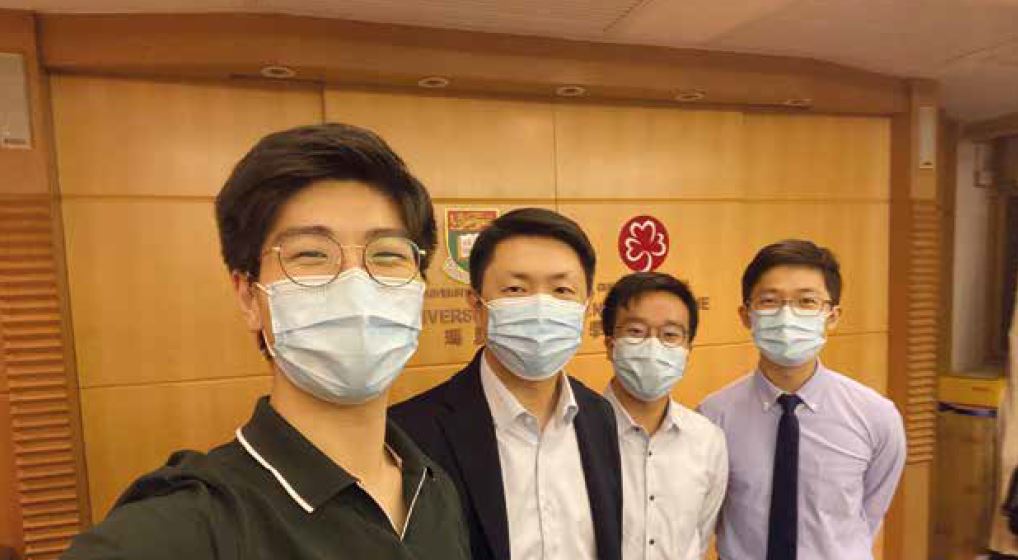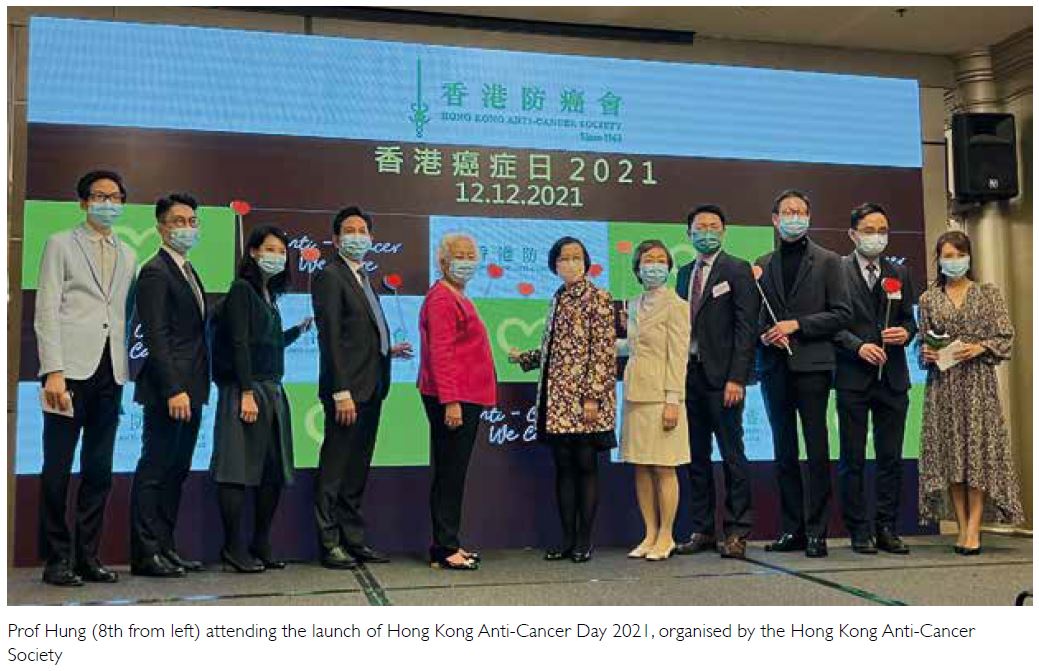© Hong Kong Academy of Medicine. CC BY-NC-ND 4.0
HEALTHCARE FOR SOCIETY
Growth in times of crisis: an interview with Professor Ivan Fan-ngai Hung
Gordon Chin1, Justin Leung2, William Xue3
1 Year 4 MB, ChB, The Chinese University of Hong Kong
2 Year 5, MB, ChB, The Chinese University of Hong Kong
3 MB, ChB
Professor Ivan Fan-ngai Hung is currently in
the public eye with his role in leading Hong
Kong’s response to the ongoing coronavirus 2019
(COVID-19) pandemic. As a co-convener of the
Expert Committee on Clinical Events Assessment
Following COVID-19 Immunisation under the
Department of Health of the Hong Kong SAR
Government, he is one of the public faces of the
vaccination campaign. He is a Clinical Professor
and Assistant Dean (Admissions) at the Li Ka
Shing Faculty of Medicine of The University of
Hong Kong, as well as the Chief of the university’s
Infectious Diseases Division since 2018, specialising
in infectious diseases as well as gastroenterology and
hepatology. Prof Hung is also a Founding Member
on the Board of the World Association for Infectious
Diseases and Immunological Disorders.
Prof Hung did not envisage himself in such
a position two decades ago. Since graduation
from Bristol Medical School in 1996, Prof Hung
had ambitions of becoming a gastroenterological
surgeon. However, after returning to Hong Kong in
1999 and starting work at Queen Mary Hospital, he
found that fate had other plans. By chance, he was
offered the opportunity to join a new infectious
diseases training position under the mentorship
of Professor Kwok-yung Yuen, a keenly dedicated
and hardworking doctor who still serves as a major
influence and role model for Prof Hung. He accepted the offer just in time to be swept up in the severe acute
respiratory syndrome (SARS) epidemic of 2003.
Prof Hung’s experiences during the SARS
epidemic remain etched into his mind. During
the now infamous ‘Amoy Gardens’ outbreak at a
residential complex in Kowloon, despite being only
a trainee at the time, he joined a team of frontline
medical officers. In the span of 3 days, these doctors
truly went above and beyond their duties as they
examined >100 patients with confirmed SARS
at United Christian Hospital, collecting samples
to investigate the identity of the pathogen. It was
immensely stressful, as they were facing a completely
unknown disease with high mortality, and with
little available personal protective equipment at
the time. Although the team feared for their safety,
they maintained their faith and resolve. For Prof
Hung, the incident was a turning point in his career,
marking the beginning of his rise to prominence.
With the emergence of the new COVID-19
pandemic, it was Prof Hung’s turn to take the lead.
In contrast to the situation with SARS, hospitals
in Hong Kong are now better equipped to handle
such pathogens. Readily available isolation facilities,
personal protective equipment, and infection control
measures help protect doctors and other healthcare
workers, and advancements in investigations
and treatment options have improved things for
patients. Similarly, the general public has learned
important lessons from SARS, and now frequently
follow better hand hygiene and facemask wearing
practices to limit the spread of COVID-19. Indeed,
everything might have changed after a decade,
but Prof Hung’s passion has remained the same.
Whereas some people are becoming numb to the
continuing COVID-19 facts and figures, Prof Hung
still maintains the same degree of dedication and
attention for each and every patient, even those very
old or frail patients who stand a chance of surviving
only with early treatment. “The key is the timing”, he
said. “We should never give up on any patients.”
While Prof Hung takes great pride in his
translational research—he has made several
breakthroughs, such as demonstrating the treatment
of severe swine flu with convalescent plasma and
hyperimmune intravenous immunoglobulin, as well
as the potentiation of an intradermal vaccine for
influenza when used with a topical agent—public
health education, particularly on COVID-19 early
antiviral treatments and vaccinations especially for
older adults, remains one of his top priorities. He
took the initiative to hold a press conference every
week at the beginning of the vaccination campaign,
hoping to disseminate accurate information to
the public and address any misunderstandings or
misinformation. He also observed autopsies of
patients who died after receiving a COVID-19 vaccine in order to carefully determine the underlying cause.
These acts, he believed, would give the public better
confidence in the COVID-19 vaccines and maintain
the momentum of the vaccination campaign.
In addition to his efforts to healthcare and
education of Hong Kong citizens, Prof Hung
contributed to the Hong Kong Anti-Cancer Society
as an Infectious Diseases specialist. In this role, he
advises immunocompromised patients with cancer
to get vaccinations for various infectious diseases,
including COVID-19, influenza and pneumococcal
infection, and also to prevent herpes zoster
reactivation as shingles. The Society, which aims
to reduce the cancer burden in Hong Kong, makes
various educational resources and videos on updated
cancer therapies, cancer prevention, and infectious
diseases prevention for patients with cancer (https://www.hkacs.org.hk/en/).
The lessons Prof Hung would share with
younger doctors and trainees are drawn from his
personal experience. “Stand for your ambitions”,
he encourages us, emphasising how he was able
to achieve his goal of being a gastroenterological
specialist despite facing the major distraction of
SARS early in his career. Nevertheless, he reminds
us that the future is unpredictable, and that plans
should not be set in stone: “Seize opportunities and
be open to trying anything”.

Figure 1. Prof Ivan Fan-ngai Hung and Student Reporters at the McFadzean Library in Queen Mary Hospital. From left: William, Prof Hung, Justin, and Gordon

Figure 2. Prof Hung (8th from left) attending the launch of Hong Kong Anti-Cancer Day 2021, organised by the Hong Kong Anti-Cancer Society

